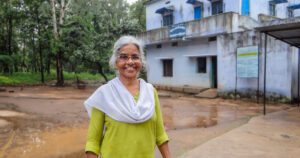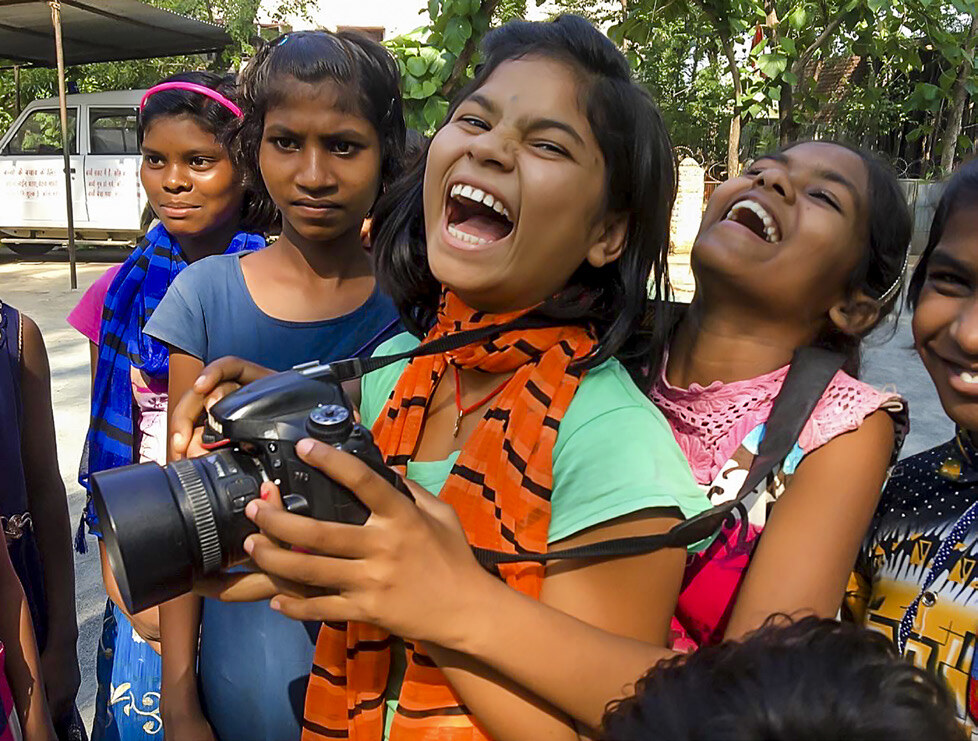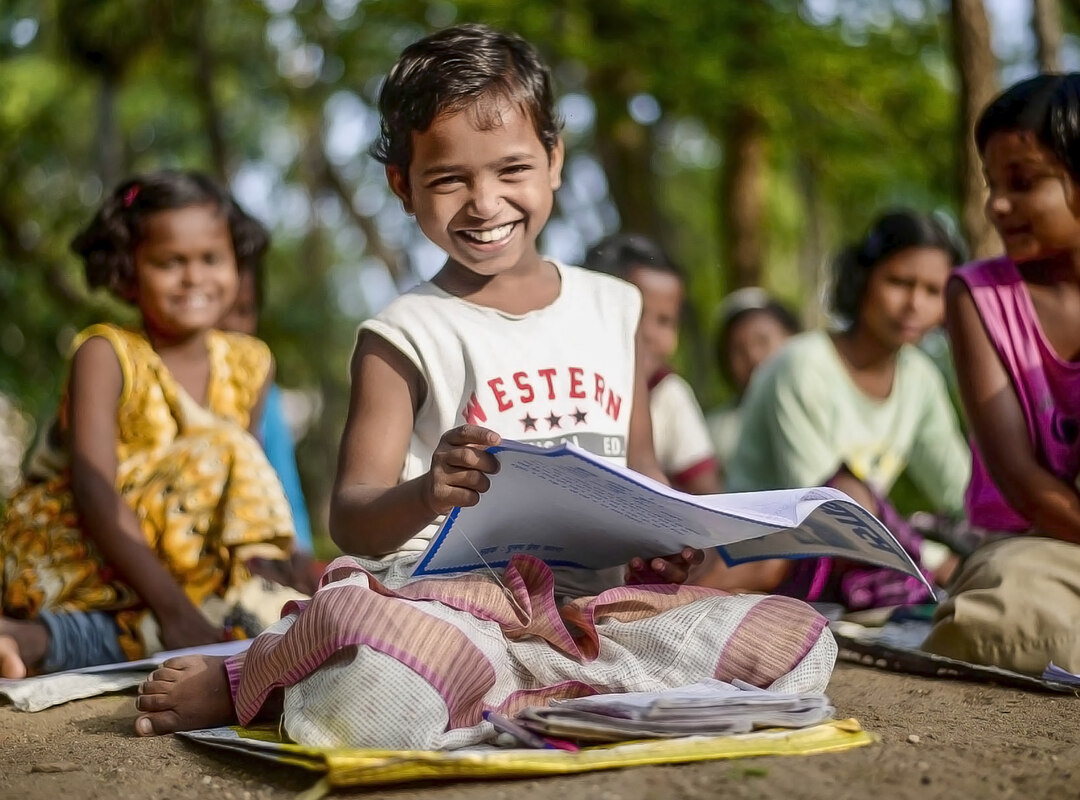Joel Urumpil, SCN, is known as a woman with compassion and passion for mission, especially for the Bhuiyan community of Chatra District, Jharkhand, India. This community, fraught with casteism and oppression, is a place where Sister Joel has worked tirelessly to be a voice and strength for the people.
“I am blessed to be a companion to the Bhuiyan community in their long and tedious journey to freedom,” Sister Joel said. She has joined them in their struggle and pain, success and sorrows.
In her first encounter with the Bhuiyan community, she asked, “Who are these people?”
“They are ‘bekar,’” she was told, a word meaning useless, no value, and non-persons, not worth worrying about. Her journey with these men, women, and children began in 1988 with Asha Bahen, a Medical Mission Sister who was living with these “useless” people in one of their huts in Khutikewal Kala, Huntergung Block, Chatra District, Jharkhand. Thirty-three years later, Sister Joel remains with the community and has found them to be creative and hardworking, but often devoid of opportunity.
Called Dalits, or untouchables, the residents are landless people, pushed to the periphery, who worked for the rich and the landlords. Men worked on someone else’s farm from morning to evening. Women looked after the children and worked in rich men’s houses. Young girls tended animals, took care of their siblings, and did household chores.
Sister Joel became a beacon of light among those in the community who did not know what to hope for but longed for freedom. It was here that she began what she believes to be her life’s work.
In time, Sister Joel and her team realized that the land where these people worked belonged to the government and not to the landlords. They began to conscientize and organize the people through a movement to acquire the land.
In the beginning, people were mortally frightened to go against the landlords. After two years of a long struggle and numerous meetings, rallies, and hunger strikes, they became the owners of 2,200 acres of land. Sadly, four village leaders were martyred in the process. That struggle was historic because the illiterate women of the Bhuiyan community were in the leading line.
The land struggle was the first step toward freedom and dignity, but there were miles to go to gain rights over resources, rights for government recourses, gender balance, and freedom from the curse of illiteracy. Following land struggle and other systemic change activities, Sister Joel decided to focus on girls’ education, because she felt education was the base for self-dignity and overall development.
The policy was to admit illiterate or semi-literate girls above 9 years of age to school, Gurukul, so that they could be saved from child marriage. These girls were kept only for one year and were sent back to their homes as a new batch of students arrived. A year of separation from home was essential to really understand what home is like. They were provided a “home” away from home, and this practice continues today.
There were fears in the beginning, but slowly the girls began to feel secure in their new surroundings. To follow a routine and disciplined way of life was most difficult for them. After 23 years, however, both the children and their parents are convinced and are eager to go through this type of education.
Within a year, they cover the syllabus of class five and can be admitted to class six. Now, there is a rush for admission. Due to scarcity of funds, though, Gurukul has to refuse many requests.
Through Gurukul, the girls acquire knowledge and self-confidence, can manage a home, and are quite good in cultural programs and competitions. They also acquire a basic understanding of child rights, gender balance and the root causes of the oppressive situation of the Bhuiyan community.
These girls have become agents of change in society. With the help of elders in their villages, they are able to challenge and stop the plundering of natural resources and question the irregularity in the services to the Dalitsor Tribals. Those who have completed their stay at Gurukul are pursuing studies, hold jobs or, in adulthood, are married to educated men. Their mothers are members of the “Struggling Women’s Committee for Freedom.” These committees have microcredit and nonbanking programs and are taking up systemic change issues.
Within the last 23 years, around 3,500 girls have passed through from the portals of Gurukul. Out of these, about 90% completed basic or college studies. For the girls, this is a launching pad for upward mobility.
There has been a slow and steady change taking place in the lives of the Bhuiyan community and Sister Joel is very much part of this change. Her wisdom and creative and innovative thinking have
enabled her to chalk out new plans and paths for the welfare of the community longing for freedom. She dares to be different and thinks out of the box. We admire her indomitable spirit, regardless of all the difficulties and troubles she faces in carrying out her mission.
 Sister Joel dares to be different for the sake of the exploited. Her love for the oppressed is seen in the changes that have come about in the Bhuiyan community. Her outspoken nature has brought a broader vision for her mission and direction for the Patna Province. She has deep faith and trust in God. She leads by example, she challenges the corrupt systems of the society and has become an agent of systemic change.
Sister Joel dares to be different for the sake of the exploited. Her love for the oppressed is seen in the changes that have come about in the Bhuiyan community. Her outspoken nature has brought a broader vision for her mission and direction for the Patna Province. She has deep faith and trust in God. She leads by example, she challenges the corrupt systems of the society and has become an agent of systemic change.
Her tireless effort to empower the girls and women of the Bhuiyan community, who had lost the opportunity to live a humane life, is greatly appreciated. She really embodies the name she has adopted, “Jyoti” (light), as she brings justice and better life opportunities to many. She is like a mother to the orphans and the unwanted; a compassionate “Behen” (Sister) to the rich and the poor alike. She is a spark of fire initiating change in society. Her brave spirit knows no limits and in her dictionary, there is no word like, “impossible.” She makes everything possible with God in her people.
Source: https://nazareth.org/










0 Comments